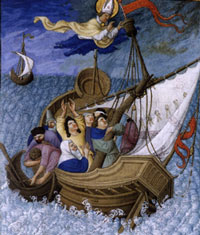The facts about St. Nicholas may be sketchy, but legends abound.
Two of the most famous tell of the bishop's special protection
of young women and children. There was in Myra, it is said, a
nobleman who had three daughters. However, the man was so poor
that he had no dowries for his daughters, and he feared they
would have to enter lives of prostitution or slavery to survive.
Nicholas, who had a large inherited fortune, heard of the poor
family. He went secretly to the nobleman's house at night where,
as he stood outside watching, a moonbeam shone directly into an
open window. He threw through the window a bag of gold, which
fell at the father's feet, providing a dowry for the oldest
daughter. Nicholas repeated his act of charity a second night,
and then a third, at which time the father, curious as to his
secret benefactor, discovered the bishop. Nicholas swore the
father to secrecy. This legend is the basis for the custom of
placing gifts or gold coins in the shoes, stockings, or baskets
of children during the night before the feast of St. Nicholas.
The second
legend tells of an Asian gentleman who sent his two sons to be
educated in Athens, and who instructed them to stop on their way
to receive a blessing from the bishop Nicholas. The boys arrived
in Myra at evening and decided to stay overnight at an inn.
During the night, the innkeeper murdered the boys and cut their
bodies into pieces, which he hid in a pickling tub. Nicholas,
warned of the gory event in a vision, went quickly to the inn,
where he charged the innkeeper with the crime. The man confessed
to Nicholas and took him to the tub where the remains were
hidden. There, as the bishop prayed, the boys' bodies were
miraculously restored to wholeness, and they rose up living from
the tub and fell at the feet of the bishop. Nicholas refused
their thanks, telling them instead to give glory to God who had
done the miracle. He then blessed them and sent them on their
way. This vivid illustration of St. Nicholas's protection of
children is often depicted in art showing him, in his episcopal
robes, standing beside a tub of naked children.
Another legend
talks of the governor Eustathius, who had taken a bribe to
condemn to death three innocent men. At the time fixed for their
execution Nicholas came to the place, stayed the hands of the
executioner, and released the prisoners. Then he turned to
Eustathius and did not cease to reproach him until he admitted
his crime and expressed his penitence. There were present on
this occasion three imperial officers who were on their way to
duty in Phrygia. Later, when they were back again in
Constantinople, the jealousy of the prefect Ablavius caused them
to be imprisoned on false charges and an order for their death
was procured from the Emperor Constantine. When the officers
heard this they remembered the example they had witnessed of the
powerful love of justice of the Bishop of Myra and they prayed
to God that through his merits and by his instrumentality then
might yet be saved. That night St. Nicholas appeared in a dream
to Constantine, and told him with threats to release the three
innocent men, and Ablavius experienced the same thing. In the
morning the Emperor and the prefect compared notes, and the
condemned men were sent for and questioned. When he heard that
they had called on the name of the Nicholas of Myra who had
appeared to him, Constantine set them free and sent them to the
bishop with a letter asking him not to threaten him any more but
to pray for the peace of the world. For long this was the most
famous miracle of St. Nicholas, and at the time of St. Methodius
was the only thing generally known about him.
 St. Nicholas is
venerated as the patron saint of several classes of people,
especially, in the East, of sailors and in the West of children.
The first of these patronage is probably due to the legend that
during his life time, he appeared to storm tossed mariners who
invoked his aid off the coast of Lycia and brought them safely
to port. Sailors in the Aegean and Ionian seas, following a
common Eastern custom, had their “star of St. Nicholas” and
wished one another a good voyage in the phrase “May St.
Nicholas hold the tiller”. St. Nicholas is
venerated as the patron saint of several classes of people,
especially, in the East, of sailors and in the West of children.
The first of these patronage is probably due to the legend that
during his life time, he appeared to storm tossed mariners who
invoked his aid off the coast of Lycia and brought them safely
to port. Sailors in the Aegean and Ionian seas, following a
common Eastern custom, had their “star of St. Nicholas” and
wished one another a good voyage in the phrase “May St.
Nicholas hold the tiller”.
St.
Nicholas Day Christmas
Index
|